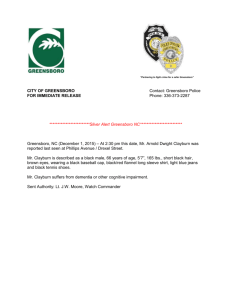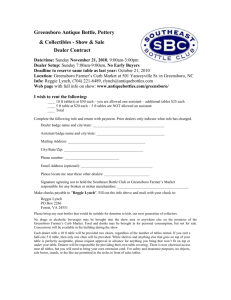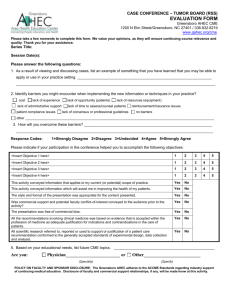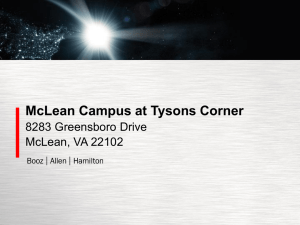Ed Whitfield - The Greensboro Truth and Reconciliation Commission
advertisement
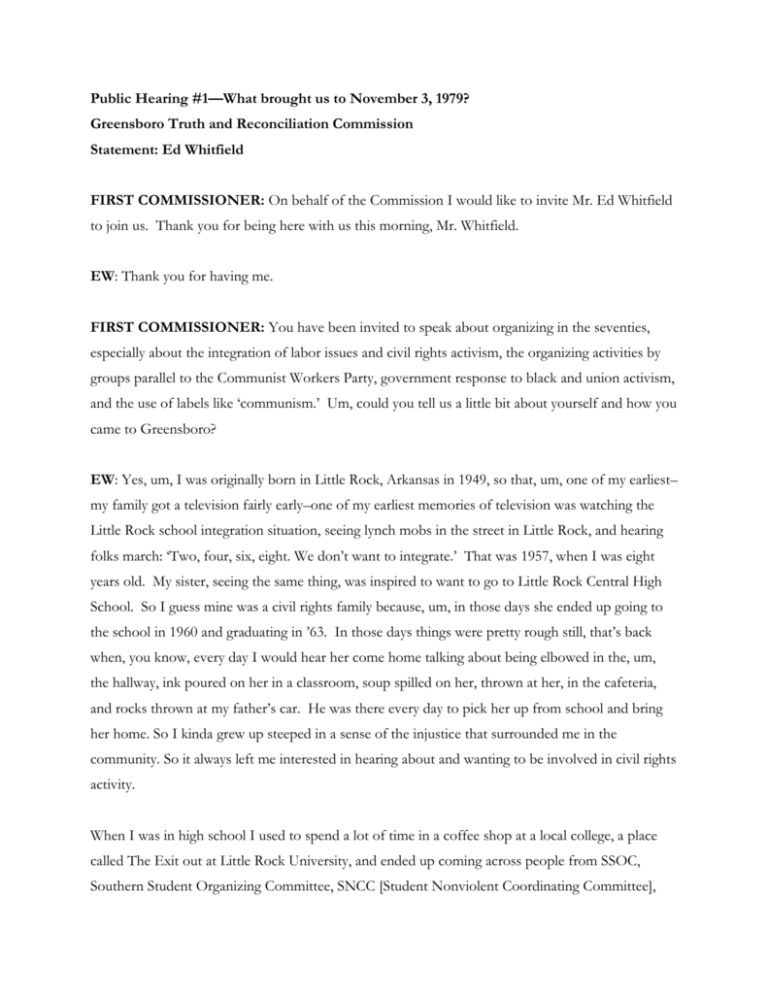
Public Hearing #1—What brought us to November 3, 1979? Greensboro Truth and Reconciliation Commission Statement: Ed Whitfield FIRST COMMISSIONER: On behalf of the Commission I would like to invite Mr. Ed Whitfield to join us. Thank you for being here with us this morning, Mr. Whitfield. EW: Thank you for having me. FIRST COMMISSIONER: You have been invited to speak about organizing in the seventies, especially about the integration of labor issues and civil rights activism, the organizing activities by groups parallel to the Communist Workers Party, government response to black and union activism, and the use of labels like ‘communism.’ Um, could you tell us a little bit about yourself and how you came to Greensboro? EW: Yes, um, I was originally born in Little Rock, Arkansas in 1949, so that, um, one of my earliest– my family got a television fairly early–one of my earliest memories of television was watching the Little Rock school integration situation, seeing lynch mobs in the street in Little Rock, and hearing folks march: ‘Two, four, six, eight. We don’t want to integrate.’ That was 1957, when I was eight years old. My sister, seeing the same thing, was inspired to want to go to Little Rock Central High School. So I guess mine was a civil rights family because, um, in those days she ended up going to the school in 1960 and graduating in ’63. In those days things were pretty rough still, that’s back when, you know, every day I would hear her come home talking about being elbowed in the, um, the hallway, ink poured on her in a classroom, soup spilled on her, thrown at her, in the cafeteria, and rocks thrown at my father’s car. He was there every day to pick her up from school and bring her home. So I kinda grew up steeped in a sense of the injustice that surrounded me in the community. So it always left me interested in hearing about and wanting to be involved in civil rights activity. When I was in high school I used to spend a lot of time in a coffee shop at a local college, a place called The Exit out at Little Rock University, and ended up coming across people from SSOC, Southern Student Organizing Committee, SNCC [Student Nonviolent Coordinating Committee], reading magazines about people like Bob Moses. And I had a first cousin who was in SNCC in Pine Bluff, Arkansas, one of the leaders of the Pine Bluff Student Movement, got put out of college fighting for, fighting for integration in that city from SNCC. So I was kinda steeped in that tradition. When I was in high school I was the head of the state–president of the NAACP youth chapters and was very disappointed to find out that the NAACP chapters of that time were more concerned with having the youth chapters raise money than engaging in any civil rights activity, which was what I wanted to do. I went to Little Rock Central and graduated in 1967 and went on to Cornell University. And when I got to Cornell the first thing that I remember was, um, um, the vice president of the Black Student Organization, a guy named John Garner in an assembly of all the black students, who had come to the campus saying, I know you all think you’re here because you’re real smart but the only reason you’re here is because your great-great-grandparents were drug to this country as slaves. That’s the only reason you’re here, really. And that struck me. That coupled with the civil rights activism. Could you turn the level down a little, we’re ringing. Thank you, thank you. That’s better. That really, you know, kinda struck me and stayed with me the whole time that I was there because the time I was at that university, while there were some options available to me to get involved in kinda making a way and preparing myself for the professional and the commercial or whatever world outside, I really spent all my time engaged in struggling to change the content of what that university was like as it related to the African American community and the struggles going on. Again, these were very turbulent times. By 1969, the spring of ’69, I was head of the Black Students Organization on Cornell’s campus and this was one year after students had been shot and killed in Orangeburg, South Carolina, while protesting, trying to integrate a bowling alley. One of the young people who was there as an organizer for SNCC, Cleve Sellers, had a teaching position on Cornell’s campus, one of the things that we had struggled for in the course of the Black Studies thing, so I knew Cleve and he brought a number of other people through Cornell’s campus. But, um, you know, I was involved in student protest, the picture from which has been, I guess was on the front page of every country–of every newspaper in the country, of students who were armed. Because at that time I was going through the university, there was a thing of not–of feeling that black folk were as much people as anybody in the world, and so consequently our lives were as valuable as anyone and that those who felt that our lives could be snuffed out easily, that that was wrong. And so I, without any embarrassment, was willing to lead people who at that point armed themselves for self-defense when we were threatened with a threat that might seem frivolous to people now. There was a white fraternity drinking club called the Mummies that, the year before–after–the death of Martin Luther King and some protest of black students on the campus, had been seen buying guns and talking about how they were going to kill somebody, so we didn’t know if they were serious or not. That was in the spring of 1969. Also in that spring, as Claude Barnes said yesterday, those of us who had been involved in some of the campus activity and the struggles for Black Studies from around the country converged on Greensboro, North Carolina, for a conference in May to form a national black student organization, which was a student organization for black unity so–boom–that was my first trip to Greensboro. When I was here then I met Nelson and Joyce and we went to–as Claude was saying–and we went over to Dudley and were part of that protest in support of those students and their rights there. When I went back to school a few days later I looked in the newspaper, and on the front page of the New York Times here I see a picture of North Carolina A & T State University, Scott Hall with some National Guardsmen crouched down behind some barricades and I was telling people, you know I was just there a couple of days ago. That’s during the time of the rebellion in Scott Hall and on that campus and in this community. Also that spring we had been involved in again organizing for black studies on Cornell’s campus, but Duke University students had been doing it, and at one time a number of them left the university to say they were going to start their own school, because the big struggle around Black Studies was who was going to determine and define what it was–was it to be kind of an academic pursuit or was it going to be a situation where people could define a curriculum that was relevant to the needs and interests of the community and be a part of the ongoing struggle in those communities. And those Duke University students had said that the university was putting too much–too many restrictions on what they wanted to do. They wanted to form their own school. They called it Malcolm X Liberation University, so it wasn’t long before I left Cornell to come to work in Malcolm X Liberation University. Before that, for a brief time, I had been the Northeast Regional Coordinator for SOBU, Student Organization for Black Unity, and before there was an African Liberation Support Committee and African Liberation Day, we organized at the United Nations in the spring of 1970 a commemoration of the Sharpeville massacre, which was the first kind of commemoration and support for African stuff organized by black folk. There were other groups doing it, the American Committee on Africa and others, but this was the first one that was initiated out of the black community in a long time. But I came to work at Malcolm X Liberation University. I was at that school for a couple of years. During that time most of us would have defined ourselves as PanAfricanists and nationalists who were activists during that time, out of a concern that our community had been damaged, disrupted by the whole process of slavery. That we were ultimately, you know, African peoples who had been transported to the United States and that we had a responsibility to help in the reconstruction and development of Africa, as well as helping to build the community here. Tremendous amount of confusion during that time period as to exactly what any of that meant, and what it meant our responsibilities were. All I knew for sure was that I was dedicated to spending my life trying to improve the condition of the community of which I was a part, and to be a part of the struggle that had been part of my consciousness since childhood. And that’s what brought me to Greensboro. When the school closed, you know, I continued to stay in the community doing kind of a community organizing, well, labor organizing mainly, and some things around education. And the role I play is, um, I spend a lot of time thinking, and more and more now writing things, and trying to help clarify the situations. In 1979, you know, one of the things that I just wanted to make clear was that I was one of the people that was in Winston-Salem at the Public Library at that activity. There were no members of the CWP, or the Workers’ Viewpoint Organization there. There were a number of different groups and individuals not even affiliated with groups that were a part–a part of the movement that existed, the anti-racist, anti-capitalist movement that existed in this community, and it would probably be easy for people from the outside to lump all of those folks together. Many of us knew each other. But there was also a high level of sectarianism that existed, where people argued as though it were life-or-death issues over questions that, quite honestly, I can’t even remember now. And these were– at the time they seemed like the most important things in the world, and they disappear into trivia and obscurity as I try to think back on them. But that level of sectarianism meant that everybody wasn’t, you know, all in the same thing, and in fact often people were at each other’s throats, and arguing and yelling as much at each other as they were at anybody else. But yeah, I was part of the group of folks who had gone over to the Winston-Salem Public Library. And in fact, in 1979, at the point of the um, uh, you know, hearing that there was an anti-Klan rally in Greensboro, and the situation in Winston Salem, that protest had developed because the Klan was making use of public facilities to spread what we considered, you know, a hate message and we thought it was illegitimate for people to invite them into those facilities to do that. The situation in Greensboro struck me as strange, because I didn’t understand it, I had not been a part of what happened in China Grove, didn’t really know about it at that time and it was, you know, like, I don’t know of any Klan activity in this local community, and plus I wonder why they don’t get the main anti-Klan fighter from the area to be at the conference if they have something planned. So that just shows the level of separation of different groups and individuals. There was a lot of different things going on. And it is probably clear to me that there was enough differences among people who knew each other that people from the outside would think all these people are the same. Quite frankly they, uh, we were not. So that’s what brought me here. I was on my way to the rally, I was on my way to the Windsor Community Center. That’s what I had seen on flyers. And I wasn’t privy to what the police department and other people knew, which was that–the change in the full permit and all that. So I was on my way there, saw nobody there, driving out to the Freeman Mill Road. Stopped at a convenience store to ask if anybody had seen a demonstration that was lost and I couldn’t find it. And they said “didn’t you hear, there are bodies laying all out there in the street in Morningside?” I thought they were joking. I was in a pickup truck with a friend of mine who had also gone with me to Winston Salem and his three-year-old child, you know, we were going to the demonstration which we thought just to be another demonstration. And we heard that. We didn’t believe it. We drove over there and saw the police tape, and realized that it was true. Later that night, trying to be involved, we went by Nelson Johnson’s house where we were told that the only way we could be involved was if we joined the Communist Workers’ Party and we [declined we] said that was okay and we ended up forming a separate group called the Concerned Citizens Against the Klan that worked in–functioned in the community and helped to organize and lead some of the protest activities, community-based protest activity and educational activity both the February demonstration as well as the one after the first verdict that we struggled to get the NAACP, the ministers’ groups and student groups, and others involved in. We were kind of a coordinating force around those demonstrations taking place. FIRST COMMISSIONER: Could you tell us a little bit about the climate in Greensboro in the ‘70s, with special regard to civil rights issues, its tie to labor issues, and the Klan-police relationship. EW: Let me do civil rights and labor kind of stuff first. By the 1970s, by the time I was here, many of the struggles in civil rights–you know around issues of public accommodation, voting rights, basic kind of open access, school integration–many of those things had already been settled, they were largely settled in the, you know, during the decade of the ’60s. And it was weird, I mean, I felt like I had missed out on being part of some of those things. Because that’s when I was wanting to go off to Alabama to be in SNCC, to Mississippi to be in SNCC, but I knew that my mother would kill me. So by then it was, like, looking at what is the current frontier, and it was clear that while access had been granted to a lot of stuff, a lot of people didn’t have the means to make use of that access. Like somebody could decide you could live in any neighborhood, it was clear you don’t have the money, you’re not going to live in any neighborhood, you’re going to live where your money affords you a chance to live, you can be able to stay at any hotel or eat at any restaurant, and if you can’t afford it–so it was clear that disparities on the economic front were kind of the main thing going on. And I remember–I was part of SOBU still–writing an article for the African World that basically said the civil rights movement is dead. You know, we won that. Let’s move on to the economic struggles that are going to make it relevant. And I remember people looked at it and got angry because they thought I was saying everything was okay. I wasn’t saying that everything was okay. I was just saying that there was a section of what had happened, that had been done, pretty much settled, and that we needed to move on to the next thing, to celebrate the fact that that had happened and that that was over. And to kind of use the same terminology, to call everything the same thing, kind of misses some of the nuances. So, again not a very deep argument, over the titling or wording of an article. But I was one of the people that was struggling a lot inside of SOBU for, you know, trying to look at how the workers’ movement was developing, and the extent that that’s going to begin to address some of the economic issues that are concerned. And there was not, from the perception of what I saw, a lot of connection between the economic struggle of trade unions and working for improved working conditions and stuff and civil rights, largely because much of the early part of the civil rights movement had been around access, which as much affected middle-class blacks as anybody else, and as such they played a lot of the leadership role in that, in a way that they were not going to play in a struggle around workers’ rights and people at the very bottom. And while they could play a supportive role, and many of them do, many of them have the same kind of arrogant values that the predominant society has about poor folk being poor ’cause they are too lazy not to be, and don’t understand the kind of structural problems that exist. So that’s what was going on and that was part of the internal dynamics, that people were arguing that it was really important to get involved in labor and the workers’ movement and maybe this is–was–going to present a way to move forward on things, to give economic support to the access that is now available so that it would actually be meaningful in people’s lives and transform them. It became very clear that while all this access was available, fundamental conditions for far too many African Americans had remained the same and there was no grand improvement of that, and that something different needed to be done. What was the next part of what you were asking? FIRST COMMISSIONER: About the relationship, the Klan-police relationship around the civil rights movement. EW: The thing I know about police relationships, some of it comes, you know, from my direct experience. I remember when the movie Mississippi Burning first came out I was invited by the News & Record to be on a panel of people who kind of previewed the movie and had something to say about it in the paper the next day. And I watched it and I was struck by the same thing that Diane Nash, who was one of the organizers in Mississippi at the time, said of it when I was there a couple of weeks ago. All that movie showed was black folk being scared and singing and it made it look like the FBI was the one who had led the freedom struggle. And I ended up in a situation in the summer of 1969, some people, some black kids were shot and severely wounded outside a malt stand in a little place called Benton, Arkansas during the summer when I was home. I heard about it and several of us went over into that community, it was about eighteen miles from Little Rock, and sat with the families of the people who were wounded and the people in that community. We met all night in a gym at a high school and the next morning I called the FBI to say that we were organizing a demonstration and asked for their support and protection, because we had assumed that it was the Klan or some Klan types in Benton that had shot these kids for going to the malt stand. All the FBI wanted to know from me was nothing about who got hurt or how the community was doing, but [what] they wanted to know was who we were, outside agitators who were there stirring this up. And I didn’t talk too long on the telephone, it was kind of irritating to me, but not surprising. Um, the whole label ‘agitator,’ I’d just like to spend a little time talking about the label of ‘agitator’ and ‘outsider’ and ‘organizer’ and stuff. I got commissioned in 1969, I think it was, during the summer too, by the Arkansas Council on Human Relations, to write a paper on voting rights and voter registration work in Arkansas. And I traveled around the state and talked to a lot of people in a lot of communities and it became real clear to me that just going out and registering people to vote in the absence of doing anything else didn’t make all that much difference, because unless people were part of some movement that was trying to change something, to register to vote gives you some alternatives, there often aren’t very much to choose from and you’re as likely to be, you know, under the sway of somebody who says, ‘Vote for reasons that I–I know,’ and you can wonder about later. So, um, to me what was key was that there needed to be some level of struggle going on that people were directly involved in. And that’s what, you know, I think of myself and others that I know and respect highly, of doing this in the communities. You never have to stir up any dissent and discord because the dissent, the anger exists, it’s every day, it’s part of the everyday life of people. Sometimes that anger is directed at people in the same community, sometimes that anger is directed inside the household, where you have kind of spousal abuse going on but what an organizer tries to do is to help people: one, understand better what it is that gives rise to the things, the conditions that they’re angry about, and two, to help them be in a position to collectively work on doing something to change it. You know, in labor, workers end up facing management that exists organized together in management organizations across the spectrum, and as an individual worker they each got very, very little power, but when you get together and say we’re going to do something collectively, then we often have at least a fighting chance. So that’s what we did in communities. And when you do that people will call it agitation, because it is–because you’re helping to stir things up, different from what is the status quo. And that is so important to do, because all of my life I have lived in a country where the status quo is severely unjust. That there are layers and layers of people, and very often the people at the very bottom are made to be pitted against each other in such a way that they think that the others there at the bottom with them are the main source of their problem, when it’s a structural thing that is different. In that way I am kind of moved by having heard the previous speaker, because I think at some point he and I are people who could have an interesting conversation. I would like to spend some time one day talking with him about the history of reconstruction. I’m sure there’re some very, very severe differences about what we understand was going on then, but I think it could be a conversation, that the community needs to engage in more of those conversations that often don’t take place and make it very simple, very easy for people at the very bottom to be pitted against each other. I probably lost the question there somewhere, I rambled on too long. FIRST COMMISSIONER: [Laughter] Yeah, in your thirty to forty years of activist works, especially in the ‘70s, what was the local government’s response toward activism? EW: Um, what I ended up seeing, you know I ended up working in a couple of union places in Greensboro. I was at Gilbarco, and I was a shop steward there, and then I went to Lorillard to work, Lorillard had the largest union and the highest percentage of unionized workers. At the time I was there, virtually every member of the plant was a union member, which was highly unusual in a situation that does not require, you know, in a Right to Work state, no one had to be a member of the union just because it’s there, and yet they had almost a hundred percent unionism, and I wanted to be a part of that. And it also was, you know, interesting to me when I found out that, you know, that a lot of the black folk working at Lorillard were a substantial part of the local NAACP, so it wasn’t just all doctors and lawyers and middle class folk as I had known it to be in Little Rock, in Arkansas. Um, there wasn’t a lot of direct contact that I ended up having with the local government as it related, um, to activism. There was never sense of a support of it. I ran for office in 1983, fighting for a district system, because again, you know the local politics was dominated by a single part of town, Northwest Greensboro, with an enlarged system where they had the best organized folk for getting out their own vote, and, you know, I was part of the effort to change that, and there was resistance on the part of the city. That resistance came up, I think, in 1980, when there was a Save Our City slate, which was an all-white slate elected to City Council. Um, and, you know, they would benevolently sit and listen to some requests from some communities. After a while, when they got used to it, they would kind of arrogantly turn down others, they were, you know, very much in charge of things. And, you know, it was only when a district system came into place that I think there was a much more open access to local government. FIRST COMMISSIONER: Thank you, Mr. Whitfield. I would now like to invite the other commissioners, if they have any questions for you. SECOND COMMISSIONER: Um, since you brought up the redistricting, or the breaking into district of the voters in Greensboro, do you think that there is any possibility at all of our returning to, let’s sa, open seats, seven or nine open seats on the City Council? EW: At this point it would probably be a violation of the Voting Rights Act. That transition was made back in the other direction, so I don’t think it’s highly likely. I do think things will be done as was done lately, as it was done lately, to limit or change access of the community to the Council when they voted to require a majority of the Council to place an item on the agenda, which I think is very anti-democratic effort, but the likelihood of actually changing back to an enlarged system under present laws is not all that likely, and would be very much resisted, even by some other communities other than the African American community. A lot of justice-loving folk in this town would oppose that. SECOND COMMISSIONER: Thank you. FIRST COMMISSIONER: Thank you, Mr. Whitfield, for talking to us this morning. EW: Thank you very much. [Thunderous applause.]
